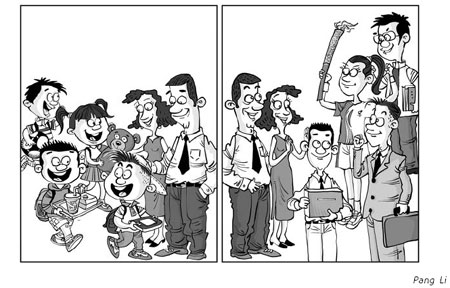(The author is a researcher with China Foundation for International and Strategic Studies)
The year 2008 is for all Chinese one of joy and sadness, both in extreme. The huge disaster caused by the earthquake in Sichuan in May and the ongoing Olympic Games offering a sense of accomplishment and pride for many are the major causes for such sentiments.

While these events catch global attention, people cannot move their eyes away from the new generation of Chinese. They waved the national flag to cheer the Olympic torch relays in London, Paris and San Francisco; they saved numerous lives out of the rubble in quake-affected areas, they formed long queues to donate their blood and money for the victims and they are now most active participants in the Olympic Games, as athletes and volunteers.

More and more media reports, Chinese and foreign, newspaper, broadcast and Internet, mention the Chinese youngsters born after 1980. Almost every piece wonders since when the kids badgering their parents for a dinner at a McDonald or KFC have grown up as a major power in the society. Who are they? What's their difference from the older generations? How could they influence the society?
With an objective perspective, we could find this generation is an inevitable consequence of the change from poverty to prosperity and from chaos to stability of the last three decades in China, the oriental giant with a long history of disturbance.
They were born and grew up at a time when the society has become more diversified, when the Chinese people nurture more self-awareness, when the society is undergoing comprehensive emancipation of mind and social reform.
They have become a unique generation of Chinese.
As the first ones born after the one-child policy was put into effect, these people received more care and attention from their families and a much better material life than their parents during their childhood even if their families were not rich.
Economic prosperity has sheltered them from social disturbances and disasters. They enjoy all the benefits brought by peace and prosperity. They know about the rest of the world, so they are full of confidence when they face foreigners. They have a strong sense of self-awareness and national identity. Given enough time, they will become the backbone of the country.
According to a recent survey among nearly 10,000 young people in Beijing, 84.3 percent admitted they were striving for set goals in life.
Ranked according to the frequency of being mentioned, these goals include achieving their ideals, owning apartments and cars, living a better life, becoming rich, holding good jobs, paying more attention to the equality of people and harmony of the society, helping disadvantaged groups, and national prosperity.
From these responses, it is easy to see that these young people enjoying an unprecedented happy and peaceful life are not content with their present status quo. Driven by swelling ambitions, they are after further joy and happiness and a rosy future.
Viewed against the backdrop of the country's industrialization and development of information technology, the ambitions of these young men and women have many things in common.
They have substantial targets, they are after a decent and respectable life without hurting others. They take equality, harmony and helping the weak as universal value and they have a clear idea about their own social responsibility and are willing to fulfill it.
Growing up in a society seeing economic boom, the young generation becomes natural supporters for equality in mind and personality. These young people are seeking a society with more human values, democracy and fairness. They feel the ultimate target is to find their own values and capabilities, instead of seeking higher positions on the social ladder or more wealth.
Some may argue that the youths mentioned above are only those living in cities and their value and pursuits differ vastly from their counterparts in rural areas.
It is true to some degree but far from the fact. For this generation, the major value and idea should be those of the urban youths, who take a higher position than others in wealth, science and culture.
Regardless of their individual targets in life, the young generation will become eye-witnesses of industrialization. They would work for industrialization while criticizing the ills of industrialization and the market out of their concern for universal values such as the dignity of human beings and conservation of nature.